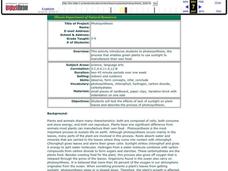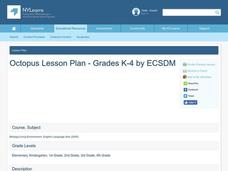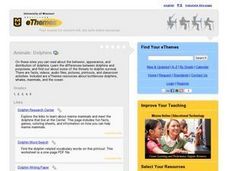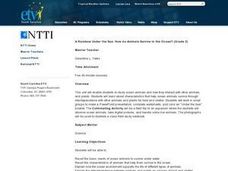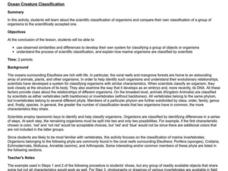Curated OER
Wildlife
The centerpiece of this lesson plan is a predator-prey simulation in which colored paperclips represent different species of animals camouflaged against a colored background. Relevant follow-up questions are provided. The activity is...
Curated OER
Week 8 - Sea Life
Using a magnifier, mini marine biologists examine the barbules of a bird feather. They swirl the it into a mixture of oil and water and then re-examine the feather. After the activity, discuss how the oily feathers pose a problem to sea...
Curated OER
Photosynthesis
Learners are introduced to the process of photosynthesis. In groups, they test the effects of the lack of sunlight on plant leaves and compare the results with their hypothesis. They note the characteristics that plants and animals share...
Curated OER
Massif Mystery
After reviewing plate tectonic theories and the discovery of both the Atlantis Massif and the Lost City hydrothermal vents, earth science learners complete a worksheet and participate in discussions about what the types of rock found...
Curated OER
Plumbing the Deep-Using Sound Waves to See
Young scholars explore and learn about the concept of echolocation. In this echolocation lesson, students explore how animals and engineers use echolocation (seeing under water) and sound waves to look and hear things under the deep water.
Curated OER
Oceans in Motion
This simple activity introduces children to basic marine life as well as to show them the necessity of protecting aquatic environments. Some famous marine life animals are introduced via vocabulary words, then children cut out pictures...
Curated OER
Oil Well That Ends Well
Focusing on the effect of oil spills on the environment, learners conduct experiments to explore this issue. First, they create an ocean environment using materials provided. Then, they make a simulated crude oil substance from vegetable...
Curated OER
Octopus Lesson Plan
Children explore the life of an octopus. They listen to a story, answer prediction questions and share their prior knowledge of animals. Young scholars observe the defense mechanism of the octopus. They create an imaginary defense...
Curated OER
Mammals of the Deep Blue
Third graders study ocean mammals. They explore various websites and databases to answer questions and record answers about whales and dolphins. Finally they use the information obtained to write a report about them.
Curated OER
A Sea Turtle Experience
Students observe live green sea turtles and use their imagination to form questions about the animals. They present these questions to their teacher. Students then complete the activity sheets highlighting sea turtle biology and...
Curated OER
Immersion Presents Monterey Bay
Students study Monterey Bay. In this Monterey Bay lesson, students create a model of upwelling around Monterey Bay. Students simulate surface water movement relative to prevailing winds.
Curated OER
Animals: Dolphins
Students use the internet to discover information about dolphins. They examine their behavior, appearance and distribution of dolphins.
Curated OER
What Ocean Animals Do Worksheet
In this ocean animals worksheet, students look at six pictures of ocean animals and then draw a line from each ocean animal to the description that matches it best.
Curated OER
Ecology And the Conservation of Natural Resources
Students study Alfred Wegener's theory of continental drift and how the continents were connected in one large land mass called Pangaea. They examine plate tectonics and the theory that the earth's surface is composed of large moving...
Curated OER
Ocean Animals - Fill in the Missing Vowels
Learners look at 8 pictures of ocean animals and fill in the missing vowel for each ocean animal. This worksheet is a very goo way for young learners to practice their vowel sounds and spelling rules.
Curated OER
Loggerhead Turtle Fun Facts
Students study loggerhead turtles and learn facts about reptiles. In this turtles lesson, students read information about loggerhead turtles and study their various sections and characteristics. Students then make their own sea turtle.
Curated OER
Animal Habitat Bar Graph
In this graphing activity, students examine a prepared bar graph and record which habitat their chosen animal lives in: desert, city, forest, ocean, prairie, or fresh water. There are no directions but it appears that a class could use...
Curated OER
A Rainbow Under the Sea: How do Animals Survive in the Ocean?
Second graders read books, watch videos, complete worksheets and participate in class discussions about ocean animals. They, in groups, design PowerPoint presentations on selected marine animals.
Curated OER
Secrets of the Ocean Realm - Survival in the Sea
Students determine the sequential links in a marine food chain and identify the roles that various organisms play in this chain. Students develop charts as visual aids for illustrating marine food chains.
Curated OER
The Vast Ocean
Students explore oceans, and demonstrate reading comprehension skills, including reading strategies, inference, literal meaning, and critical analysis.
Curated OER
Ocean Exploration: How Doea you Data Grow? (Grades 7-8)
Learners explore fieldwork. In this seventh or eighth grade mathematics lesson plan, students watch a video on data collection in the field. Learners use fieldwork to gather data about their school environment. Students compile data...
Curated OER
Ocean Creature Classification
Students develop their own system for classifying a group of objects or organisms using observed similarities and differences. They investigate the process of scientific classification, and explain how marine organisms are classified by...
Curated OER
QUIZ 1A: Nouns, People, Places, Animals, and Things
In this noun classification worksheet, students 25 nouns in the provided word bank and classify them in a graphic organizer according to common and proper nouns that that name people, places, or things.
Curated OER
QUIZ 1A: Nouns-People, Places, Animals, and Things
In this nouns review worksheet, students examine 50 nouns and classify them in the correct columns. This worksheets requires students to note the differences between common and proper nouns.
Other popular searches
- Ocean Ecosystems Animals
- Oceanic Trenches and Animals
- Grassland Animals Ocean
- Ocean Plants and Animals
- Oceans Animals
- Oceanic Animals Adaptations




